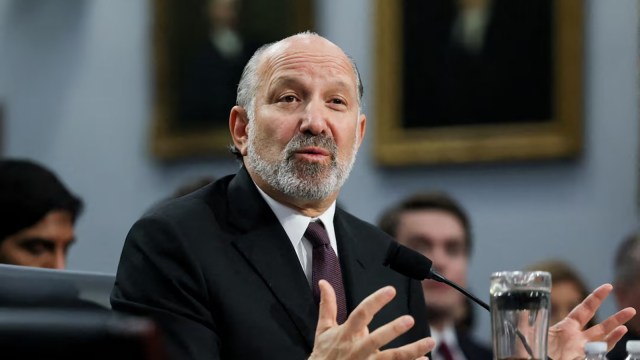Amid early signs of easing of trade tensions between the United States and India, US Commerce Secretary Howard Lutnick said Thursday that the Donald Trump administration is going to “sort out” a trade deal with India, but once New Delhi stops buying Russian oil.
“We’re going to sort out India. You know, India basically has to open their market, has to stop buying Russian oil,” Lutnick said in an interaction with American business news channel CNBC. He was responding to a question on which trade deal negotiations he was most focused on.

“People don’t remember India didn’t buy Russian oil before the war with Russia and Ukraine…1 per cent of their oil was from Russia. And now 40 per cent of their oil is from Russia because we’ve sanctioned it, so they can buy it, you know, $7-10 a barrel cheap. So, they’re buying it, refining it, and then selling it to the rest of the world and making a bundle. So, the president (Trump) called nonsense on that and said you got to stop that stuff. So, I think India we’ll sort it out once they stop buying Russian oil,” Lutnick added.
Notably, the US Commerce Secretary’s comments come close on the heels of Trump posting on social media that India and the US are “continuing negotiations to address the trade barriers”. Responding to Trump’s, Prime Minister Narendra Modi said both countries “will work together to secure a brighter, more prosperous future”.
These posts reflect a somewhat easing of tensions between Washington and New Delhi, that built up partly due to the trade pact negotiations between the two countries faltering and India’s hefty imports of Russian crude emerging as a major irritant for the Trump administration. Last month, Trump slapped an additional tariff of 25 per cent on Indian goods—over and above the 25 per cent tariffs announced earlier—as a “penalty” for buying Russian oil.
“I am pleased to announce that India and the United States of America are continuing negotiations to address the Trade Barriers between our two Nations. I look forward to speaking with my very good friend, Prime Minister Modi, in the upcoming weeks. I feel certain that there will be no difficulty in coming to a successful conclusion for both of our Great Countries!” Trump posted on Truth Social on Wednesday.
“India and the US are close friends and natural partners. I am confident that our trade negotiations will pave the way for unlocking the limitless potential of the India-US partnership. Our teams are working to conclude these discussions at the earliest. I am also looking forward to speaking with President Trump. We will work together to secure a brighter, more prosperous future for both our people,” Modi posted on X, responding to Trump’s post.
Story continues below this ad
Indian refiners’ heavy imports of Russian crude are seen as a lever that the Trump administration believes it can use to force the Kremlin’s hand into ending the Ukraine war. Oil exports are the biggest source of revenue for Moscow, and New Delhi is the second-largest buyer of its oil after Beijing. But despite US rhetoric and imposition of secondary tariffs, India has shown no signs of backing down on Russian oil imports.
New Delhi has termed the Trump administration’s action “unjustified and unreasonable” and said these imports began as its traditional supplies were diverted to Europe, with the US having “actively encouraged such imports by India for strengthening global energy markets stability”. The Joe Biden administration had encouraged India to increase Russian oil imports following Russia’s February 2022 invasion of Ukraine as the West began shunning Moscow’s oil. The reason was simple: Russia is a major oil exporter and if a bulk of its oil goes off the market for dearth of buyers, international oil prices could shoot up, something that the US itself did not desire.
The Indian government has consistently maintained that the country will buy oil from wherever it gets the best deal, as long as the oil is not under sanctions. There are no sanctions on Russian oil; it is only subject to a price cap imposed by the US and its allies that applies if Western shipping and insurance services are used for transporting the oil. India’s public sector refiners have stated that they have not received any signal or directive from the government on the issue, and they will continue to buy Russian oil as long as it remains economically and commercially viable.
India is the world’s third-largest consumer of crude and depends on imports to meet around 88 per cent of its requirement. Russian crude, which usually comes at a discount, has helped India save billions of dollars’ worth of foreign exchange over the past three years.
Story continues below this ad
While there is a domestic trade-off at play—the prohibitive cost of sky-high US tariffs on India’s small and medium exporters versus the relatively lower savings accrued by large refiners by buying discounted Russian crude—Trump’s public posturing has made it difficult for India to cut back on Russian oil immediately even if it wanted to. It is clear that New Delhi does not want to compromise on its strategic autonomy and is unwilling to be dictated to by Washington on whom it should be doing business with, particularly when it comes to Russia—an old and key strategic partner.
When Russia invaded Ukraine in February 2022, Moscow’s share in New Delhi’s oil imports was less than 2 per cent. With much of the West snubbing Russian crude following the invasion, Russia began offering discounts on its oil to willing buyers. Indian refiners were quick to avail the opportunity, leading to Russia—earlier a peripheral supplier of oil to India—emerging as India’s biggest source of crude within a matter of months, displacing the traditional West Asian suppliers. Currently, Russia accounts for more than a third of India’s oil imports by volume.

































